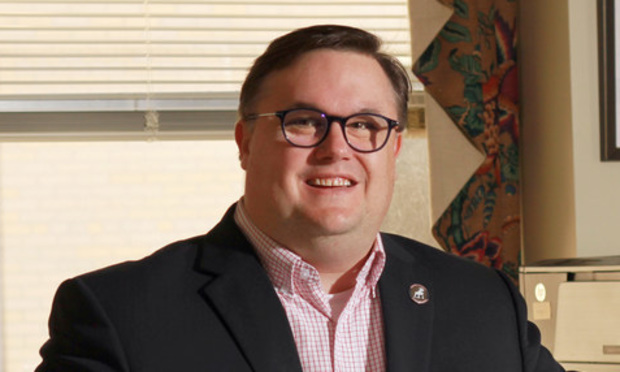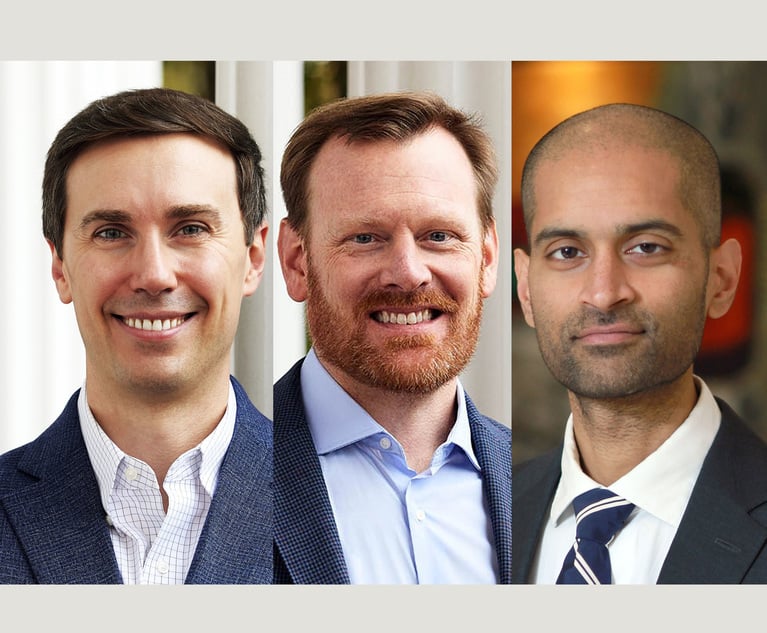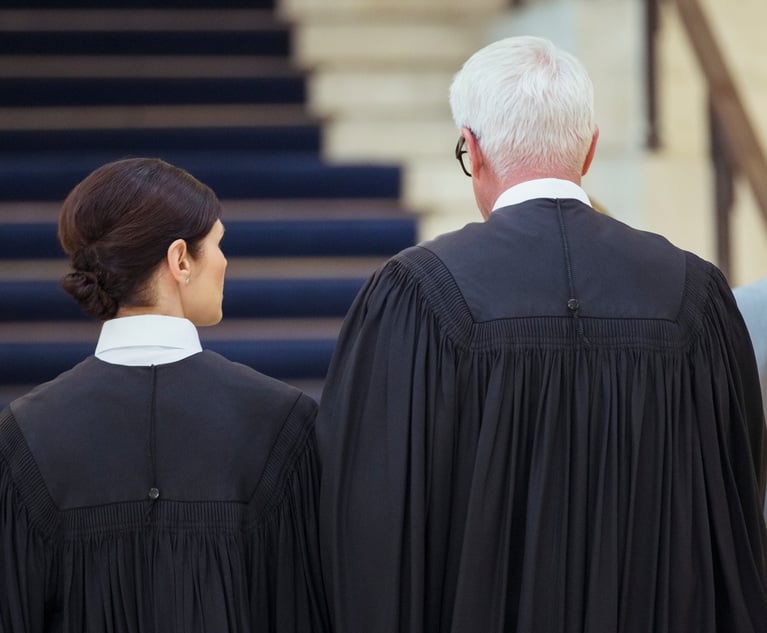Best Social Mediators: Chief Judge Stephen Dillard
"There is a significant benefit to not being able to speak out on public policy issues: It forces you to listen to those who hold contrary positions and consider alternative viewpoints."
June 19, 2019 at 02:00 PM
3 minute read
 Chief Judge Stephen Dillard, Georgia Court of Appeals (Photo: John Disney/ALM)
Chief Judge Stephen Dillard, Georgia Court of Appeals (Photo: John Disney/ALM)
We like to think of the Georgia Legal Awards as the pinnacle of a legal community recognition, but in the case of Chief Judge Stephen Dillard of the Court of Appeals of Georgia, we take a back seat to the people's representatives.
This year, the Georgia House of Representatives named Dillard the state's “Twitter laureate.” House Resolution 35 said Dillard “has been using social media to connect with the Georgians he serves, to educate them about the judicial process, and to promote civility, kindness, and compassion.” They made particular note of his standard Friday weekend wishes: “be good to each other.”
For his nearly 16,000 Twitter followers, Dillard frequently takes “judicial notice” of their birthdays, discusses college football, the Constitution, legal writing, and the art of oral argument. He keeps the conversation upbeat and nonpolitical. He does show a bias in favor of footnotes and the Oxford comma—and his beloved Samford University.
What are your goals when you post content on social media?
My primary goal is to inform the citizens I serve exactly what we do as judges on the Court of Appeals of Georgia. I also seek to promote excellence in appellate practice, professionalism, civility, and civics education. Additionally, I use social media platforms to be a virtual mentor to law students and young lawyers in Georgia and throughout the United States. Finally, I want those who follow me on social media to know who I am as a person.
What's the biggest challenge you have in your role as a judge—which by custom limits what you may want to say publicly—and your enjoyment in keeping your Twitter feed fresh?
I am not bothered by the limitations on what I can say as a judge. I embrace them. I want the people who appear before me to know that they will receive a fair shake and that I am fully committed to serving all of my fellow Georgians. There is also a significant benefit to not being able to speak out on public policy issues: It forces you to listen to those who hold contrary positions and consider alternative viewpoints. I learn a great deal from the thoughtful people I interact with on social media platforms, and they are largely responsible for keeping my commentary somewhat interesting.
This content has been archived. It is available through our partners, LexisNexis® and Bloomberg Law.
To view this content, please continue to their sites.
Not a Lexis Subscriber?
Subscribe Now
Not a Bloomberg Law Subscriber?
Subscribe Now
NOT FOR REPRINT
© 2025 ALM Global, LLC, All Rights Reserved. Request academic re-use from www.copyright.com. All other uses, submit a request to [email protected]. For more information visit Asset & Logo Licensing.
You Might Like
View All
Spalding Jurors Return $12M Verdict Against State Farm Insurance Client
10 minute read

Trending Stories
Who Got The Work
Michael G. Bongiorno, Andrew Scott Dulberg and Elizabeth E. Driscoll from Wilmer Cutler Pickering Hale and Dorr have stepped in to represent Symbotic Inc., an A.I.-enabled technology platform that focuses on increasing supply chain efficiency, and other defendants in a pending shareholder derivative lawsuit. The case, filed Oct. 2 in Massachusetts District Court by the Brown Law Firm on behalf of Stephen Austen, accuses certain officers and directors of misleading investors in regard to Symbotic's potential for margin growth by failing to disclose that the company was not equipped to timely deploy its systems or manage expenses through project delays. The case, assigned to U.S. District Judge Nathaniel M. Gorton, is 1:24-cv-12522, Austen v. Cohen et al.
Who Got The Work
Edmund Polubinski and Marie Killmond of Davis Polk & Wardwell have entered appearances for data platform software development company MongoDB and other defendants in a pending shareholder derivative lawsuit. The action, filed Oct. 7 in New York Southern District Court by the Brown Law Firm, accuses the company's directors and/or officers of falsely expressing confidence in the company’s restructuring of its sales incentive plan and downplaying the severity of decreases in its upfront commitments. The case is 1:24-cv-07594, Roy v. Ittycheria et al.
Who Got The Work
Amy O. Bruchs and Kurt F. Ellison of Michael Best & Friedrich have entered appearances for Epic Systems Corp. in a pending employment discrimination lawsuit. The suit was filed Sept. 7 in Wisconsin Western District Court by Levine Eisberner LLC and Siri & Glimstad on behalf of a project manager who claims that he was wrongfully terminated after applying for a religious exemption to the defendant's COVID-19 vaccine mandate. The case, assigned to U.S. Magistrate Judge Anita Marie Boor, is 3:24-cv-00630, Secker, Nathan v. Epic Systems Corporation.
Who Got The Work
David X. Sullivan, Thomas J. Finn and Gregory A. Hall from McCarter & English have entered appearances for Sunrun Installation Services in a pending civil rights lawsuit. The complaint was filed Sept. 4 in Connecticut District Court by attorney Robert M. Berke on behalf of former employee George Edward Steins, who was arrested and charged with employing an unregistered home improvement salesperson. The complaint alleges that had Sunrun informed the Connecticut Department of Consumer Protection that the plaintiff's employment had ended in 2017 and that he no longer held Sunrun's home improvement contractor license, he would not have been hit with charges, which were dismissed in May 2024. The case, assigned to U.S. District Judge Jeffrey A. Meyer, is 3:24-cv-01423, Steins v. Sunrun, Inc. et al.
Who Got The Work
Greenberg Traurig shareholder Joshua L. Raskin has entered an appearance for boohoo.com UK Ltd. in a pending patent infringement lawsuit. The suit, filed Sept. 3 in Texas Eastern District Court by Rozier Hardt McDonough on behalf of Alto Dynamics, asserts five patents related to an online shopping platform. The case, assigned to U.S. District Judge Rodney Gilstrap, is 2:24-cv-00719, Alto Dynamics, LLC v. boohoo.com UK Limited.
Featured Firms
Law Offices of Gary Martin Hays & Associates, P.C.
(470) 294-1674
Law Offices of Mark E. Salomone
(857) 444-6468
Smith & Hassler
(713) 739-1250







